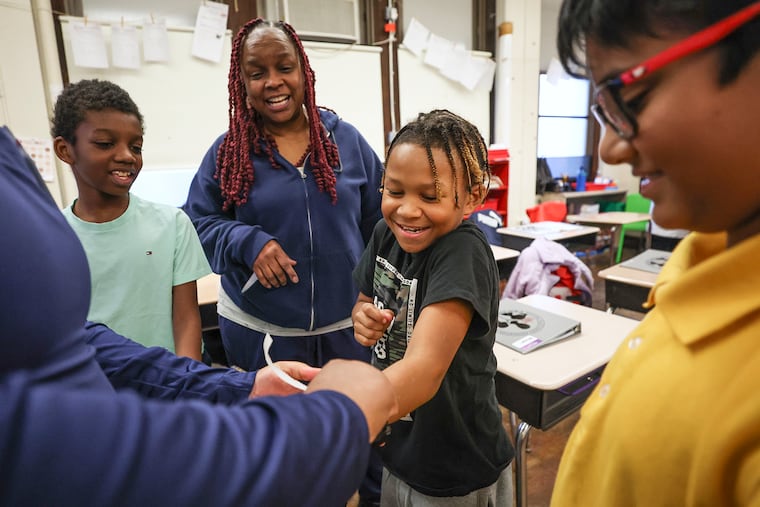A ‘mini nurse academy’ for elementary school students is trying to diversify nursing
“Nursing as a profession is very white and female,” said Monica Harmon, SEPABNA’s chapter president. “To see black nurses leading and educating is powerful for the students.”

School nurse Clarissa Collier held up a pocket-size medical device on a recent afternoon at North Philadelphia’s General George Meade Elementary School and asked if any students in the class could identify it.
Jayden Sanabria shot his hand into the air. The 9-year-old fourth grader recognized the glucometer — a device to measure blood sugar — from his own experience: “My mom has diabetes. Every morning, I help her with her medicine,” he said.
Watching his mother manage her diabetes helped inspire Jayden to spend one afternoon a week learning about a potential career in nursing from Collier and other Philadelphia nurses at an after-school program called the Mini Nurse Academy. The two-month course offers an introduction to nursing, first aid, and health care, designed for elementary school students. The program is hosted by the Southeastern Pennsylvania Area Black Nurses Association, a local chapter of the National Black Nurses Association.
“We break it down to language the kids understand,” said Venus Gwynn, a retired nurse in the local NBNA chapter. “There’s a lot of opportunities for students in junior high and high school, but we’re introducing this career to younger kids.”
Looking to diversify the nursing profession
Sixteen students at Meade opted into the Mini Nurse Academy this year — including a few, like Jayden, who participated in the program the year before and enjoyed themselves so much they decided to come back.
Now in its second year, the class is designed to introduce Black and brown students, in particular, to the field of nursing.
“Nursing as a profession is very white and female,” said Monica Harmon, SEPABNA’s chapter president. “To see Black nurses leading and educating is powerful for the students.”
During a recent class, the students, ages 8 to 11, covered a breadth of topics. They wrapped blood pressure cuffs around each other’s arms. They counted carbohydrates and sugars to prepare a healthy meal for someone with diabetes.
”Everything has sugar in it,” one child sighed during the lesson.
“Just about,” Collier said, laughing.
They also learn first aid techniques, like CPR, and how to apply pressure to a wound to slow bleeding.
The lessons can be applied close to home. Some students, like Jayden, have family members who deal with chronic health conditions. Others have witnessed violence in their neighborhoods. One fourth-grader said he was interested in becoming a nurse because he’s seen “too many people get hurt” and wanted to be able to help them.
“Some of the kids have seen people stabbed or shot — the trauma that’s gone on,” Simpson said. “They can appreciate this information, like how to stop bleeding. It makes them feel more in control, because they could actually do something if they needed to.”
The program’s instructors say the class is just as valuable for them as it is for students. Jamisen Williams, a nursing student at Thomas Jefferson University who works with the Mini Nurse Academy as part of her clinical rotation, said she’s proud to act as an example to children interested in nursing.
“It’s important for the kids to see people who look like them in nursing,” she said, especially considering the health disparities among communities of color. “And they’re really learning some core values [of the profession].”
Gwynn, of the Black Nurses Association, said the organization stays in touch with students even after they graduate the program, hoping to connect them to further opportunities in nursing.
“It’s not just a one-off,” Simpson said.